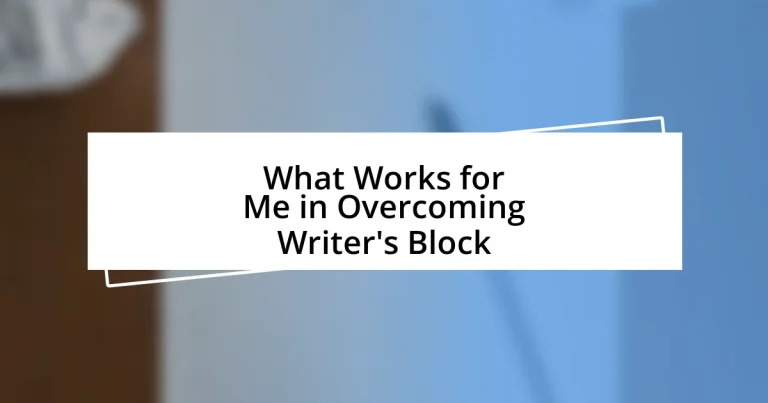Key takeaways:
- Identifying personal triggers, such as stress and negative self-talk, allows for proactive steps to mitigate writer’s block and enhances creativity.
- Establishing a consistent writing routine fosters a productive mindset, leading to increased focus, a state of flow, and reduced feelings of overwhelm.
- Utilizing free writing techniques and creative prompts encourages exploration and innovation, transforming obstacles into opportunities for deeper expression and connection.

Understanding Writer’s Block
Writer’s block can feel like an unwelcome guest that just won’t leave. I remember sitting in front of my laptop, staring at a blank screen, the cursor blinking mockingly at me, and wondering, “What’s wrong with me today?” It’s that sinking feeling when the words that usually flow so easily suddenly dry up, and you start doubting your capabilities as a writer.
There are so many reasons why we experience this phenomenon. Sometimes, it stems from perfectionism. I often find myself trapped by the desire to produce something flawless, which ironically holds me back from even starting. Isn’t it strange how the pursuit of perfection can lead to stagnation? Recognizing this tendency in myself has been a pivotal step in my quest to push through the dreaded block.
Emotional fatigue is another culprit. I once found myself grappling with personal issues while trying to write about a light-hearted topic, and it just didn’t click. Have you ever tried forcing your thoughts in one direction while your heart is tugging you in another? It can be exhausting. Understanding these emotional layers is crucial, as it helps me navigate through the block, allowing me to re-engage with my writing more authentically.
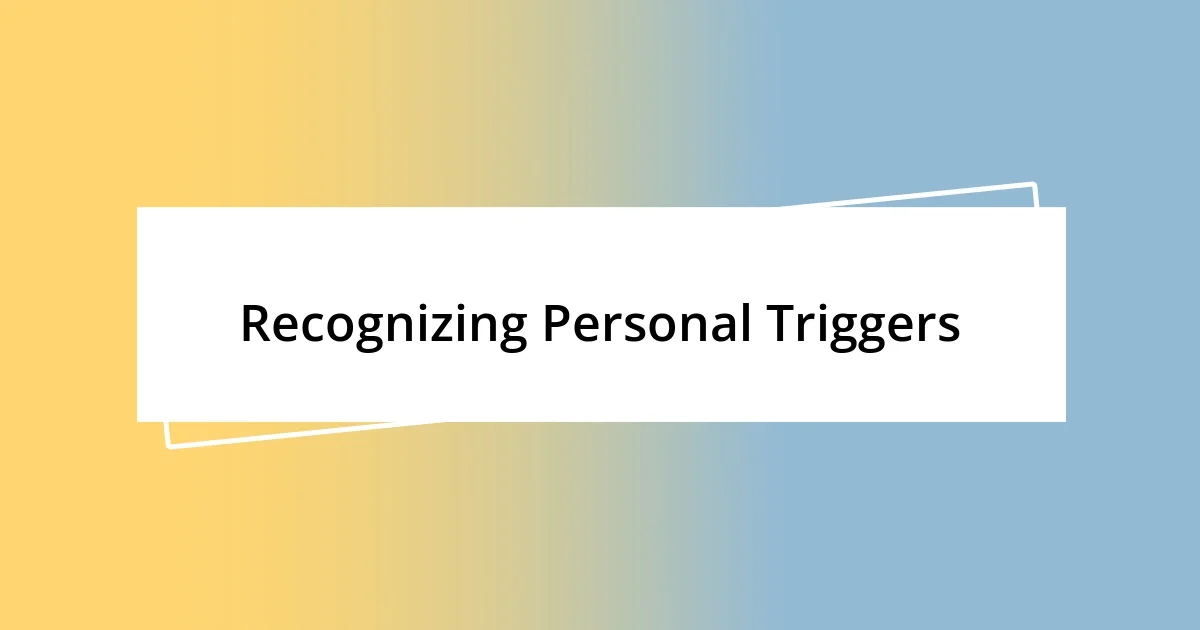
Recognizing Personal Triggers
Recognizing my personal triggers has been a game changer in overcoming writer’s block. For instance, I’ve realized that when I’m overwhelmed by my to-do list, my creativity takes a backseat. It’s almost as if my mind is crowded with tasks, leaving no room for inspiration. I’ve learned to pause, clear my mental slate, and focus on what truly matters—my writing.
Some of my personal triggers include:
- Stress and deadlines: When I’m up against the clock, it often crushes my creative spirit.
- Changing environments: A cluttered workspace or noise can derail my focus significantly.
- Negative self-talk: That inner critic of mine can be the loudest voice, making me doubt my abilities.
- Fatigue: Lack of sleep or physical exhaustion can cloud my thoughts, making writing feel laborious.
- Social media distractions: Scrolling through feeds can sap my energy and motivation without me even realizing it.
By identifying these triggers, I’ve found I can take proactive steps to mitigate their effects, allowing my creativity to flourish rather than flounder.
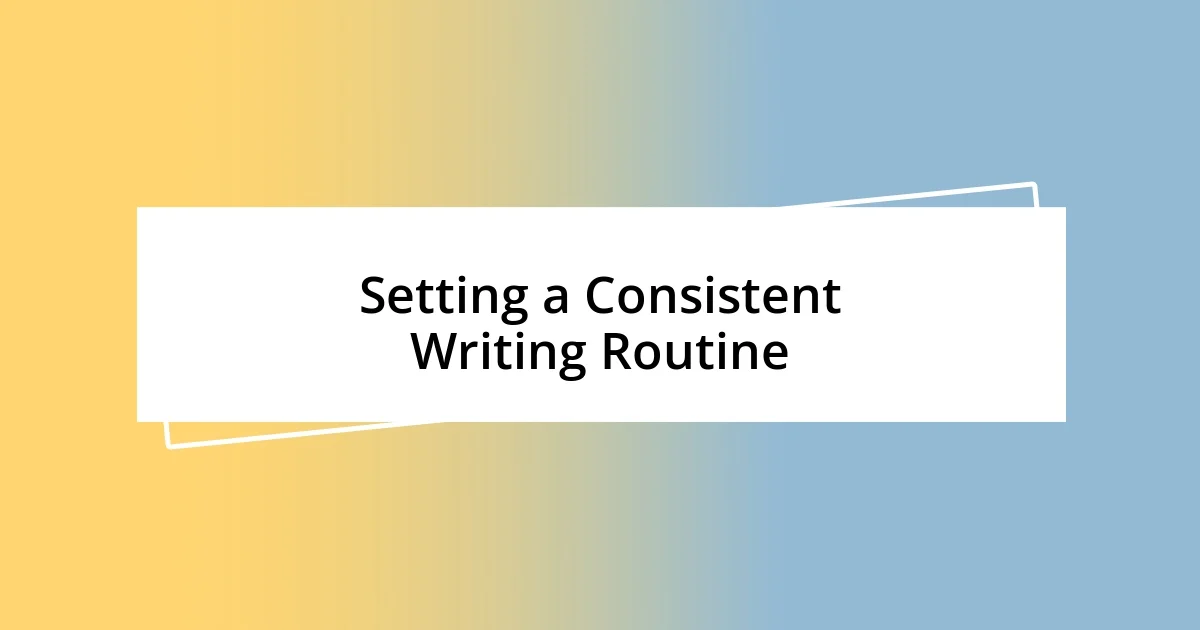
Setting a Consistent Writing Routine
Setting a consistent writing routine has been one of the most effective strategies in my fight against writer’s block. I find that when I dedicate specific times for writing, my mind starts to associate those periods with creativity and focus. It’s almost like my brain shifts into a different gear, Knowing that it’s “writing time” allows me to enter a flow state more easily. Have you ever noticed how habits can shape your productivity?
In my experience, having a routine minimizes the chances of procrastination. I once tried writing at different times each day and felt lost—my ideas often came, but the inconsistency left me frustrated. Now, I write each morning before the day gets hectic. It’s remarkable how this small shift created a sense of rhythm in my writing life. As I get into the habit, my creativity feels less like a chore, and more like a delightful exploration.
Here’s a comparison of having a writing routine versus not having one:
| With a Writing Routine | Without a Writing Routine |
|---|---|
| Consistent creative output | Inconsistent and sporadic writing |
| Increased focus and flow state | Frequent distractions and lack of focus |
| Reduced feelings of overwhelm | Heightened stress and frustration |

Embracing Free Writing Techniques
Embracing free writing techniques has truly transformed my approach to overcoming writer’s block. There have been mornings when I felt utterly stuck, peering at a blank screen, but then I’d take a deep breath and begin jotting down whatever came to mind—no filters, no judgments. What’s fascinating is that this unstructured approach often reveals ideas I didn’t even know were buried in my mind. Have you ever tried letting your thoughts flow freely?
One time, I set a timer for just fifteen minutes and wrote nonstop about my day, my fears, and even random thoughts that crossed my mind. Surprisingly, I stumbled upon a completely new storyline that evolved from what seemed like a chaotic stream of consciousness. This experience reinforced my belief that there’s power in allowing oneself to write without rules. It’s like giving your mind the freedom to wander where it pleases, which can lead to remarkable discoveries.
I’ve learned that free writing isn’t just a technique; it’s a mindset. When I finally let go of perfection and embraced the messiness of my thoughts, I felt an immense wave of relief. It’s liberating to know that, in those moments, I’m not aiming for polished prose—I’m exploring my creativity. How empowering is it to shift your focus from fear of failure to the joy of expression? Free writing has taught me to celebrate the process, and in turn, my writer’s block has significantly diminished.
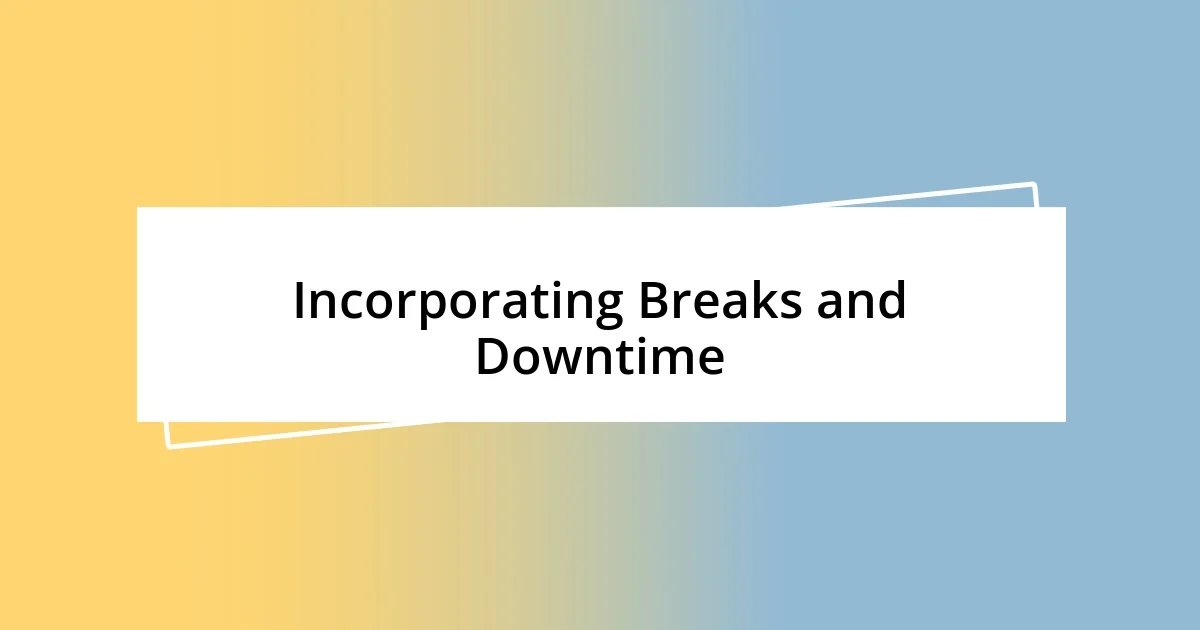
Incorporating Breaks and Downtime
Taking breaks and allowing for downtime has been a game-changer in my writing journey. I remember feeling completely drained after long hours at my desk, convinced that pushing through was the only way to get the words flowing. However, stepping away—even for just a short walk—has often led to unexpected bursts of inspiration. Have you ever noticed how a change of scenery can refresh your mind?
What I’ve found is that our brains, much like sponges, need time to relax and absorb information. I love taking these breaks to do something completely unrelated to writing. Sometimes, I’ll make a cup of tea or play a quick round of my favorite game. In those moments away from my work, I often find my subconscious takes the reins, stitching together ideas I didn’t even realize were forming. It’s almost like magic—what was once a block transforms into clarity when I return to the screen.
I’ve also become more intentional about incorporating longer downtime into my routine. For instance, I’ve dedicated weekends to engage in hobbies I adore, like hiking or painting. These activities help me recharge and foster a different kind of creativity. When Monday rolls around, I find I’m not just refreshed but also equipped with new perspectives that enrich my writing. How do you prioritize downtime in your creative process? For me, it’s all about balance and recognizing that sometimes, stepping back can propel me forward.
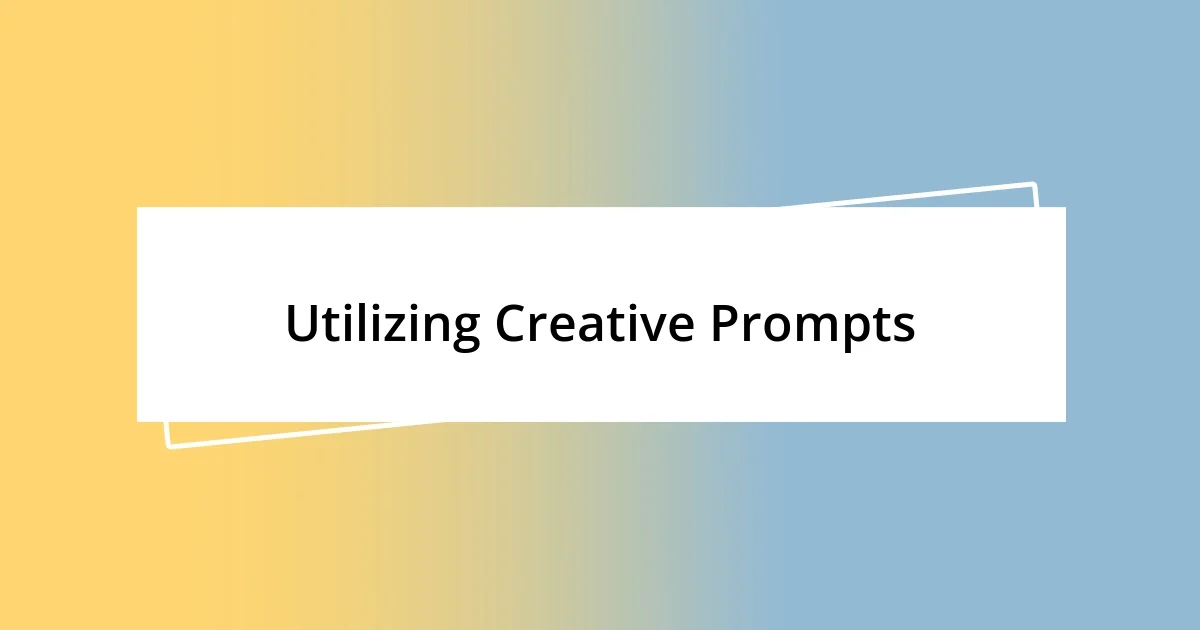
Utilizing Creative Prompts
Utilizing creative prompts has become one of my secret weapons against writer’s block. I remember a particularly challenging day when I felt lost for words, so I turned to a prompt I found online: “Describe a room that holds a vivid memory.” As I let my pen flow, I pictured my grandmother’s vintage living room, the scent of freshly baked cookies wafting through the air, and suddenly, characters began to emerge with their own stories. It was incredible how a simple prompt could unlock such vivid imagery and emotions deep within me. Have you ever fallen into a rabbit hole of creativity simply because of a prompt?
One memorable evening, I set up a “prompt jar” filled with little slips of paper, each containing a unique challenge. When the block hits, I randomly select one and commit to writing for ten minutes on that topic. I recall pulling out a slip that read, “Write about a day that changed your life.” This exercise led me to reflect on a pivotal moment in my career, ultimately inspiring a blog post that resonated with many readers. The prompt transformed what felt like an obstacle into a pathway toward meaningful connection. Isn’t it wild how external ideas can steer our internal thoughts?
Moreover, I’ve noticed that creative prompts can be a fantastic way to shake up routine. Sometimes, I invite friends over for a writing night, and we share random prompts aloud, building off each other’s ideas. The excitement in the room is palpable, and it surprises me how diverse our interpretations can be. This collaboration often ignites fresh insights for my writing, proving that even in isolation, creativity thrives in community. How do you approach inspiration together with others? I’ve found that not only does it alleviate writer’s block, but it deepens my appreciation for the act of writing itself.
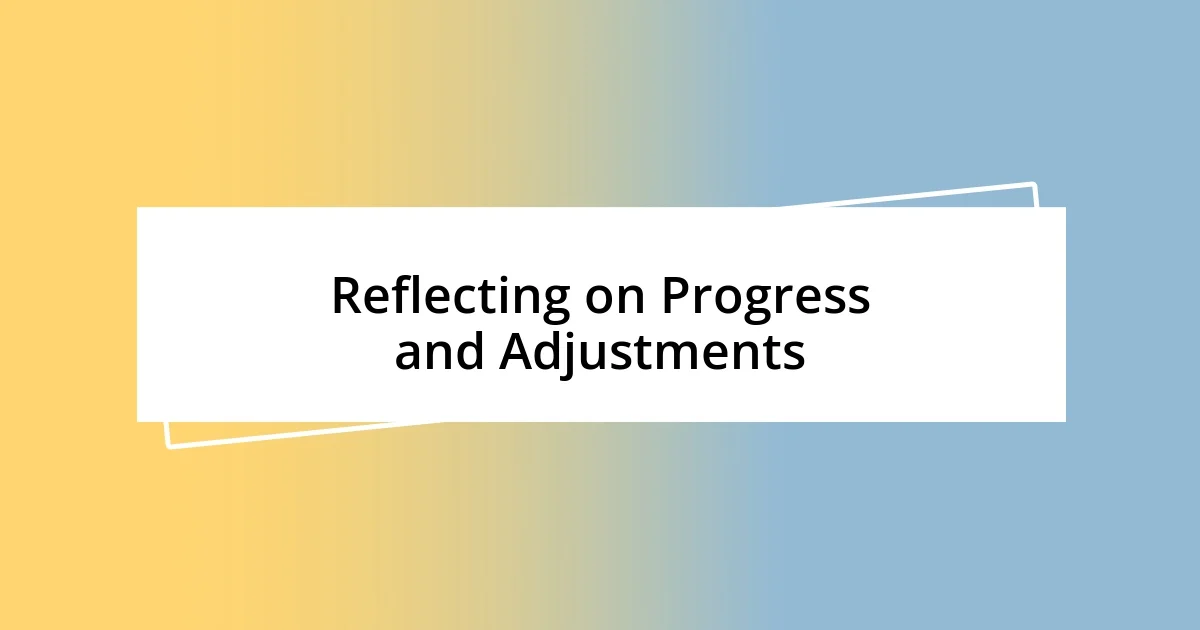
Reflecting on Progress and Adjustments
It’s fascinating to reflect on my progress and the adjustments I’ve made over time. I remember early on in my writing journey, I took a rigid approach to my routine, convinced that consistency was key. But, as I began to document my feelings and experiences, I realized flexibility was equally important. Have you ever found yourself clinging to a structure long after it stopped serving you? For me, recognizing when it was time to change my writing environment made a world of difference.
One significant adjustment I made was keeping a progress journal. This simple practice allows me to review my growth, not just in terms of word count but also in the emotional risks I’ve taken with my writing. I can recall a moment when I reread entries from a few months back—parts of my writing felt like stepping stones to a deeper understanding of myself. It’s empowering to see how my voice has evolved, which motivates me to continue pushing my boundaries. When was the last time you evaluated your own journey in a meaningful way?
I often find myself revisiting the lessons learned from previous blocks. Each challenge has contributed to my development, and acknowledging these milestones has helped me craft a more intuitive writing process. There are days when I struggle, but looking back shows me that perseverance pays off. I’ve learned to celebrate the small victories, realizing that every word I write—whether perfect or not—brings me closer to my goals. How do you celebrate your own progress, even when it feels slow? For me, every step forward—no matter how tiny—deserves recognition.












